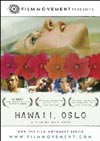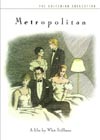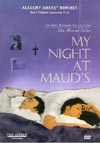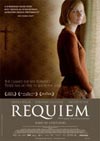Much as we love independent and foreign film here at Christianity Today Movies, there isn’t always room on our bill of fare to serve up those off-the-beaten-path movie morsels that sometimes offer more food for the soul than the average commercial flick.
So we’re launching “Movie Gourmet,” a quarterly article featuring a buffet of smaller films that might premiere at a remote film festival or play in limited release before making their way to random art houses and revival theatres. You know the saying, “Coming soon to a theater near you”—with these flicks, there’s no guarantee. But fret not—you’ll certainly have access to them on video some day, if not already.
Some films featured in this article may be way off the beaten track—perhaps virtually unseen on big screens in North America, but well worth tracking down for its spiritual and artistic content. With that, here’s our first sampling of delectable films with a distinctly spiritual flavor—gourmet fare not likely to be served at your local fast-film franchise, but certain to delight the most discerning cinematic palate.
Our Feature Presentation
Hawaii, Oslo (2004) was a huge hit in its native Norway before being submitted as that country’s official entry for the 2005 Academy Awards. It’s a kaleidoscopic film that follows a dozen characters whose fates converge on an Oslo street corner one hot summer night.
The intricately constructed narrative draws comparisons to other multi-plot films with morality (or even metaphysics) on their minds, Magnolia and Crash in particular. Doug Cummings notes that “it resembles a companion piece to Kieslowski’s The Decalogue compressed into a two hour feature, less notable for its aesthetic innovations than for its emotional clarity and ethical complexity.” What strike me are the similarities to Tom Tykwer, both visually and thematically—Run Lola Run, Heaven, and The Princess and The Warrior are all referenced. How’s that for a pedigree!
There’s little I can say about Hawaii, Oslo without spoiling its revelations and spelling out its mysteries. If you take my advice and track down a copy—it’s a particularly rich film for repeat viewings or group discussion—be careful little eyes what you read: reviews, film festival blurbs, and especially the descriptions at online rental sites are likely to rob you of a good deal of the film’s narrative and thematic satisfaction. The screenwriter is careful to reveal character interconnections gradually, artfully, and much of the story’s richness lies in the challenge of discerning who’s who, and who’s whose.
More than anything, Hawaii, Oslo is a film about salvation—not necessarily divine, though the film does gesture in that direction, but mostly just the common, human variety that quietly sustains the world day after day. It’s a film about the quiet ways that ordinary people save each other, or strive to, or fail to, but manifest something glorious even in the striving. (For more, click here.)
On DVD
Metropolitan(1990), Whit Stillman’s subtle, sophisticated and and oh-so-Austenian film, is a recent Criterion release. “A Mighty Fortress” heralds the opening credits, an elegant piano violin arrangement that quickly gives way to the film’s neo-Jazz Age theme. There’s a shot of the Pan Am building, its windows illuminated in the shape of a cross, then we’re swept up into the world of debutante balls and exclusive Park Avenue afterparties, beginning—strangely enough—with an intense after-midnight conversation about the existence of God.
Metropolitan is the first of a trilogy of Stillman pieces, linked by milieu and theme, that might almost be subtitled “The Discreet Charm of the Urban Haut Bourgeoisie”—films whose sparkling wit and pervasive Christian worldview are examined in a wonderful 2002 anthology Doomed Bourgeois In Love: Essays on the Films of Whit Stillman, which celebrates the films as “a major achievement of Christian humanism in our time.”
As his characters move from the debutante balls of Metropolitan to the dance clubs of The Last Days Of Disco (1998) to Bible-dancing Presbyterianism in Barcelona (1994), the childhood protections of naivete and privilege erode: Stillman’s characters are increasingly confronted with their own limitations and mortality, and find themselves reaching for something beyond what youth, money and social standing can provide. (For more, click here.)
My Night At Maud’s (1969) is one of French director Eric Rohmer’s “Six Moral Tales,” recently released in a Criterion boxed set. The protag is a perfectly bourgeois 34-year-old engineer, recently converted to Catholicism. No sooner is he smitten with the beautiful girl he sees in church than his Marxist friend introduces him to Maud, a sensuous, accomplished and thoroughly secular woman of the world who sets out to seduce this earnest, reflective young man.
Like Stillman’s characters, these people are talkers, thinkers, readers: they argue Pascal’s wager and apply it to Marx’s theory of history, they question the philosopher’s asceticism (“Christianity is not a moral code, it’s a way of life”) and conjecture that mathematics can be as much an occasion of sin as lust. Jansenism—”Catholic Calvinism,” a mix of grace, predestination and piety—is a preoccupation of the characters that plays itself out in the events of the story, where choice, luck and grace weave together in a playful metaphysical courtship dance. It’s an exquisitely French, exultantly Catholic little romance, a sexy film about chastity with a head full of ideas. (For more, click here.)
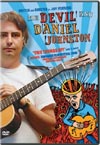 |
Buy this DVD |
The Devil and Daniel Johnstonis a respectful documentary study of the popular, possibly brilliant outsider musician who suffers from mental illness. Johnston sees God and the Devil everywhere, and creates endless amounts of bizarre music and artwork, which may be symptoms of his bipolar disorder, or expressions of genuine talent and religious experience. Whatever you make of Daniel’s faith, though, there’s real soul nourishment in this film—and I’ll leave you to discover the source. Meanwhile, check out our interview with director Jeff Feuerzeig.
Also, check out the foreign section (or even the previously viewed bin) at your local video emporium for L’Enfant, the latest Cannes-winning masterpiece from Belgians Luc and Jean-Pierre Dardenne. In his glowing review, Jeffrey Overstreet refers to the film’s “profoundly spiritual storytelling,” calling it “one of the most artful and memorable films you’ll see this year.” Also readily available is The Three Burials Of Melquiades Estrada, which Josh Hurst celebrates for its “uncanny aesthetic and theological similarities to Flannery O’Connor’s short fiction—dark humor, startling violence, spiritual restlessness, a flare for the grotesque, and a keen understanding of man’s depravity that will doubtless strike some moviegoers as mere misanthropism.” It struck me as brilliant, though it wasn’t until late in the film that I came round to that point of view.
Now showing
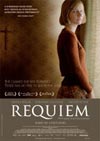
Currently in theaters, Requiem, a restrained and understated treatment of the same events that inspired Scott Derrickson’s The Exorcism of Emily Rose (2005), dramatizes the tragic exorcism in 1976 of a young German university student whose “demonic” manifestations may have been supernatural in origin, or may have been some form of epilepsy.
The fascination of the Derrickson film lay in the interaction between the director’s Christian convictions about the reality of evil and genre expectations raised by fictionalizing the story in the guise of a commercial horror pic. Requiem sticks much closer to the historical events, employing a matter-of-fact cinematic style that elicits more sorrow than terror, resulting in a sympathetic psychological study that refuses to come down on either side of the natural / supernatural debate, leaving the viewer with the same agonized perplexity one might experience in the face of such events in real life. Both films are anchored by stage actresses in breakout turns: Jennifer Carpenter delivers a body-blow physical performance in the title role of Emily Rose, while Sandra Hueller’s tightly contained uber-naturalism as Michaela Klingler won her the Silver Bear at this year’s Berlin Film Festival. Requiem is a rigorous, heart-breaking film: highly recommended.
49 Up is the latest installment in an every-seven-years series of documentaries that began with Seven Up, BBC’s playground portrait of a dozen British school children in 1963. Acknowledged as one of the greatest documentary projects in the history of film, the current release sees more than one of the subjects drawing sustenance from a life of faith.
And here are some other independent films currently working their way around North American cinemas that I’ve not yet had the opportunity to see, but which might be worth checking out for their interest in spiritual themes:

Deliver Us From Evil, an angry indictment of sexual abuse among the Roman Catholic clergy, is being praised by reviewers and approached warily by some Christians. Director Amy Berg focuses her documentary eye on Oliver O’Grady, a confessed pedophile whose predatory behavior in several California parishes over many years is described not only by his victims but also—remarkably—by the priest himself. With such an emotionally charged issue, it will be difficult to discern whether the film is anti-Catholic or anti-sin: while orthodox Christians may feel uneasy with details such as an opening title card that quotes from “The Gospel of Thomas,” it’s worth remembering that the film does reach for balance by including the stories of abuse victims who still practice their Catholic faith.
The Journals of Knud Rasmussen, Norman Cohn and Zacharias Kunuk’s follow-up to the popular Atanarjuat (The Fast Runner), looks at the impact on Inuit culture of contact not only with European culture but with Christianity, and the conversion away from traditional shamanistic beliefs. Don’t go looking for The Mission on ice: from the sounds of it, this fictionalized film’s perspective on the impact of the Christian faith doesn’t find much to celebrate. Which isn’t to say the film won’t be fascinating: anyone interested in the cross-cultural issues involved in mission work might find this a thought-provoking case study.
Only Human is something like a Spanish Guess Who’s Coming to Dinner, only the comedy’s broader, the dinner is kosher and this Sidney Poitier is Palestinian. Whether it moves beyond the comic possibilities of culture clash to the deeper questions of religious faith looks doubtful, but hey—it looks fun.
Coming soon

Copying Beethoven, opening in limited release November 10, is a historical drama directed by Agnieszka Holland. Uneasy about hiring a young woman to help copy his Ninth Symphony manuscripts, the mercurial composer confides in a bartender; “I’m starting a new chapter in my life. New forms, a new language. And now this woman is sent to me at this very moment. What if she was sent … by Him? Suppose it’s a sign. That it’s time for me to join with Him.” It’s not the first time this Polish director has tackled a religious theme: check out The Third Miracle, Europa Europa, To Kill a Priest or, currently in production, Magnificat, described thus: “A gentle music-loving Irish monk, elected as a malleable interim Pope, announces that he wants to canonise a Lutheran Protestant—Johann Sebastian Bach.” Combine that with Copying Beethoven and, say, Amadeus, you’ve got yourself quite the triple feature.
Perfume: The Story of a Murderer, opening December 27, is a Tom Tykwer picture adapted from the Patrick Suskind novel about an 18th century Parisian orphan whose olfactory obsession turns him into a mass murderer. A few years back, a pastor friend of mine insisted I read the book for its insights into the nature of sin and salvation, arguing that it’s not an amoral novel, but a moral one that shows the reality and consequences of evil—think of doctors Faustus or Jekyll. I wasn’t entirely sure, myself, but in the hands of Tykwer, who’s always got one eye on heaven, I’m keen to give it another look.
Danielson: A Family Movie is expected to open in theatres “this winter,” with DVD release slated for March 2007. Apart from some nifty animation, it’s a fairly ordinary biopic about an anything-but-ordinary alternative band that will appeal to established fans (many of the Christians) but may win few new ones. Founder Daniel Smith pulled together his gospel-singing sibs to play primitive/arty music for an art school grad show—think Partridge Family meets Frank Zappa—then took the defiantly weird show on the road, Jesus-saturated lyrics, nurse’s uniforms and all. Perhaps unintentionally, probably inaccurately, the film leaves the impression of a career that’s lost its way, a sad contrast to the rising trajectory of sometimes-band-member Sufjan Stevens.
For more of Ron Reed’s musings on off-the-beaten-path films, check out his blog, Soul Food Movies.
Copyright © 2006 Christianity Today. Click for reprint information.

